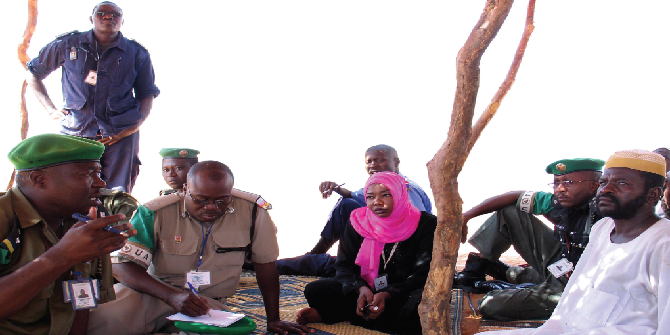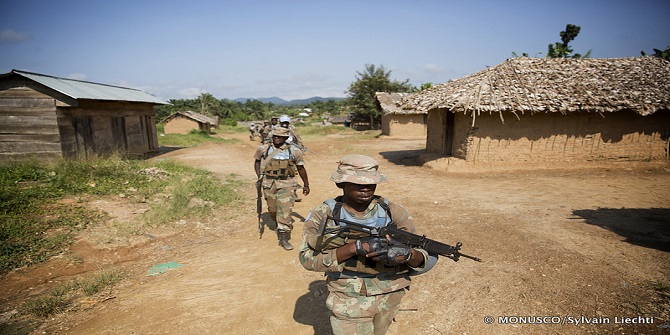In this blog, Tom Kirk and Anna Macdonald explore the JSRP’s research on local justice mechanisms in conflict-affected states. They argue that the accessibility and legitimacy of justice institutions cannot be assumed, and that those wishing to engage them must understand them as embedded in wider social norms, political contests and upheavals.
As with the JSRP’s other thematic areas, the programme’s research on justice was influenced by systematic reviews of the existing literature and evidence. The reviews sought to capture both the literature on transitional justice and that on everyday justice provision in fragile and conflict affected states (FACS). The former was deemed important as many of the studied regions’ host transitional justice or post-conflict truth and reconciliation initiatives supported by national and international organisations, whilst the latter reveals the systems and processes people are actually using to mediate disputes and seek redress. Both also directly relate to donor organisations’ continuing belief that the rule of law is a necessary (although rarely sufficient) condition for peace and development.
Broadly viewed, the reviews highlight a gap or disconnect between local perceptions and experiences of justice, and practitioners’ normative assertions about what their interventions ought to achieve. With respect to transitional justice, this has historically led to a host of problems; from misunderstandings over language and culturally appropriate ways to deal with the aftermaths of conflicts, to ignorance of the manner in which interventions may be received by different social groups within host countries. Given this, Macdonald argues that ‘It is difficult, if not impossible, to delineate what and whom transitional justice is for, and what it is meant to achieve’.
The reviews also identify a turn towards what are broadly described as ‘traditional’ justice institutions. Nonetheless, they reveal an ambiguity over whether working with them will help communities reconcile or simply entrench existing power inequalities, including the dynamics that originally led to conflict. Furthermore, quite separate from often valorised ‘traditional’ mechanisms, are a vast range of pervasively complex local systems – involving a variety of public authority figures from clan elders, to local councillors, to NGO staff – that regulate the dispensation of justice and accountability, but are rarely captured in scholarly or policy accounts.
The need to acknowledge the complexity of justice provision on the ground is elaborated upon in Macdonald and Allen’s latter survey article that draws upon the JSRP’s research across our fragile and conflict affected sites. They argue that in many contexts populations have long moved between ‘jurisdictions and authorities’, involving state and non-state powerholders, making appeals to cosmological or communal concerns, as the situation demands. Thus, forms of social accountability are inextricably linked to recent social upheavals.
For example, in North-Eastern Uganda and the Democratic Republic of Congo, JSRP researchers suggest a situation of ‘legal pluralism’ has been brought about by colonial legacies and sustained by contemporary conflicts (Allen; Porter; Verweijen); whilst in South Sudan (O’Byrne), Sri Lanka and Nepal (Stein; Valters; Ramani and Valters) it is argued that the introduction of new norms and institutions by powerful vested interests, including the church and international interveners, has increased opportunities for ‘forum shopping’ among different, and sometimes competing, justice mechanisms.
Nonetheless, the JSRP’s studies are united in their recognition that the provision of justice in FACS is often intimately bound up with both state and non-state actors’ claims to positions of public authority. Thus, they show how as the state and local justice institutions atrophy and break-down, adapt to new realities, or are engaged by outsiders, opportunities are created for some groups to seize political and economic power, and significant difficulties befall others. To further understand how these processes effect ordinary people and justice provision it is worth exploring some of this research in more depth.
To begin, Verweijen’s study of ‘popular in/justice’ – including stoning, beating or burning to death – in the Fizi and Uvira regions of the eastern DRC illustrates how disenfranchised youth are incentivised to engage in such practices to claim a measure of ‘social political agency’. It is argued that such acts are connected to popular notions of ‘revenge’, ‘punishment’, and ‘social cleansing’, and that they are a way of ‘coping’ with weak state authority. At the same time, the study reveals that national level politicians draw upon these groups and their violence in wider ongoing political contests. This is justified through appeals to the struggles of the Mai-Mai militias that were active during the First and Second Congolese Wars (1996-2003). In this way popular forms of justice become entangled in broader political networks and disputes.
The JSRP’s studies of northern Uganda also illustrate how conflict can contribute to changes in the way justice is provided. For example, through long term ethnographic engagements Allen, and Allen and Reid, show how responses to accusations of witchcraft and sorcery have become less overtly violent over the last 30 years, whilst retaining their communal role as methods of ‘social cleansing’ in times of ‘moral panic’. They hook their narrative around past instances of mob-violence and its gradual replacement by the practice of voting, with state support, on whom to exile when accusations arise. This newer practice involves a somewhat wider section of the community in the dispensation of justice, including local officials and politicians, than the vigilante mobs of older eras. Nonetheless, they warn that it is contributing to the formalisation of the norm that the innocence or guilt of those accused is secondary to the community’s need for social cohesion.
This need for social cohesion is analysed in-depth in Porter’s work (here and here) on sexual violence and rape in the same region northern Uganda. Porter finds that these incidents are also dealt with by promoting what is understood as ‘social harmony’. A consequence is that raped women have to enter into healing processes and mediation with their rapist, and usually end up having to live with or near him. In other words, promoting social harmony might be perceived locally as sustaining public mutuality or civil relations, but in practice it is grounded in what might be described as gendered oppression.
Macdonald and Porter (forthcoming) explore the idea of social harmony further in an in-depth study of the first Lord’s Resistance Army war crimes prosecution, that of Thomas Kwoyelo. They examine what the trial means for those most affected by the crimes he allegedly committed, and find that responses to the trial have been shaped by people’s specific war time experiences, if or how his prosecution relates to their current circumstances, and by the profound value of social harmony and a continuing distrust of higher authorities to dispense justice.
In many of the JSRP’s research areas, the state’s own efforts to strengthen itself after conflicts also affects the way in which justice is provided. This is illustrated by Hopwood et al’s study of the changing fortunes of Uganda’s Karamonjong women. Belonging to a marginalised region with a limited state presence, the government’s drive to disarm their traditionally pastoral communities has left them unable to defend themselves against armed cattle raiders, simultaneously impoverishing them and laying extra-livelihood burdens at women’s feet. In response, local elders have become increasingly unwilling to address women’s justice issues without payment. These developments leave many women vulnerable to domestic violence and, coupled with the absence of state justice mechanisms, with few avenues to seek redress.
Similarly, international interventions can have unintended or unexpected effects. Macdonald’s (forthcoming) study of transitional justice in northern Uganda finds that, as part and parcel of conventional liberal peacebuilding packages, it promotes a repertoire of normatively driven policies that have little bearing on lived realities of social accountability in post conflict settings. She argues that in promoting the idea that political relationships can be altered, and that optimal liberalizing settlements can be arrived at through the application of a certain practices, there has been little space for genuine debate about the justice needs of conflict affected communities in post-conflict northern Uganda.
This brief exploration of the JSRP’s work on local justice mechanisms raises a number of questions about how we should perceive or judge the reality of justice provision by multiple authorities in FACS. In particular, there is a need for analyses which are empirically grounded and that does not just focus on how justice institutions should look, but also on their meaning in each context. This is not a call for cultural relativism. Rather, it is for a practical approach that understands what is happening and what could be possible in each context; information which is often lacking when outsiders seek to reform state institutions or engage supposedly traditional justice mechanisms. It would also go some way towards uncovering how these institutions change over time, becoming more or less accessible, and gaining or loosing legitimacy in response to wider events.
At the heart of such a turn would be an effort to gather the perceptions and experiences of ordinary people. As the authors of the JSRP literature reviews suspect, this would likely reveal their desire to address the more problematic elements of local normative systems, sometimes with reference to the state or international norms, and sometimes without. In turn, such evidence would help theorists and practitioners to move between an unhelpful dichotomy between liberal and communitarian versions of justice that has long plagued analyses and interventions.
Tom Kirk is the JSRP’s Online Editor and a PHD candidate at the London School of Economics and Political Science. Dr Anna Macdonald is a LSE Fellow in the Department of International Development.
Photo credit: The Advocacy Project via Foter.com / CC BY-NC-SA
———————————————————————————————————————————-
Note: This article gives the views of the authors, and not the position of the Justice and Security Research Programme, nor of the London School of Economics or of Palladium International Development.





